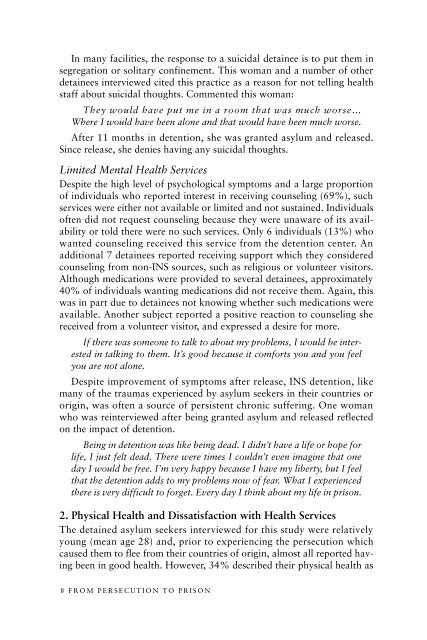From Persecution to Prison - Bellevue/NYU Program for Survivors of ...
From Persecution to Prison - Bellevue/NYU Program for Survivors of ...
From Persecution to Prison - Bellevue/NYU Program for Survivors of ...
Create successful ePaper yourself
Turn your PDF publications into a flip-book with our unique Google optimized e-Paper software.
In many facilities, the response <strong>to</strong> a suicidal detainee is <strong>to</strong> put them insegregation or solitary confinement. This woman and a number <strong>of</strong> otherdetainees interviewed cited this practice as a reason <strong>for</strong> not telling healthstaff about suicidal thoughts. Commented this woman:They would have put me in a room that was much worse…Where I would have been alone and that would have been much worse.After 11 months in detention, she was granted asylum and released.Since release, she denies having any suicidal thoughts.Limited Mental Health ServicesDespite the high level <strong>of</strong> psychological symp<strong>to</strong>ms and a large proportion<strong>of</strong> individuals who reported interest in receiving counseling (69%), suchservices were either not available or limited and not sustained. Individuals<strong>of</strong>ten did not request counseling because they were unaware <strong>of</strong> its availabilityor <strong>to</strong>ld there were no such services. Only 6 individuals (13%) whowanted counseling received this service from the detention center. Anadditional 7 detainees reported receiving support which they consideredcounseling from non-INS sources, such as religious or volunteer visi<strong>to</strong>rs.Although medications were provided <strong>to</strong> several detainees, approximately40% <strong>of</strong> individuals wanting medications did not receive them. Again, thiswas in part due <strong>to</strong> detainees not knowing whether such medications wereavailable. Another subject reported a positive reaction <strong>to</strong> counseling shereceived from a volunteer visi<strong>to</strong>r, and expressed a desire <strong>for</strong> more.If there was someone <strong>to</strong> talk <strong>to</strong> about my problems, I would be interestedin talking <strong>to</strong> them. It’s good because it com<strong>for</strong>ts you and you feelyou are not alone.Despite improvement <strong>of</strong> symp<strong>to</strong>ms after release, INS detention, likemany <strong>of</strong> the traumas experienced by asylum seekers in their countries ororigin, was <strong>of</strong>ten a source <strong>of</strong> persistent chronic suffering. One womanwho was reinterviewed after being granted asylum and released reflectedon the impact <strong>of</strong> detention.Being in detention was like being dead. I didn’t have a life or hope <strong>for</strong>life, I just felt dead. There were times I couldn’t even imagine that oneday I would be free. I’m very happy because I have my liberty, but I feelthat the detention adds <strong>to</strong> my problems now <strong>of</strong> fear. What I experiencedthere is very difficult <strong>to</strong> <strong>for</strong>get. Every day I think about my life in prison.2. Physical Health and Dissatisfaction with Health ServicesThe detained asylum seekers interviewed <strong>for</strong> this study were relativelyyoung (mean age 28) and, prior <strong>to</strong> experiencing the persecution whichcaused them <strong>to</strong> flee from their countries <strong>of</strong> origin, almost all reported havingbeen in good health. However, 34% described their physical health as8 FROM PERSECUTION TO PRISON



